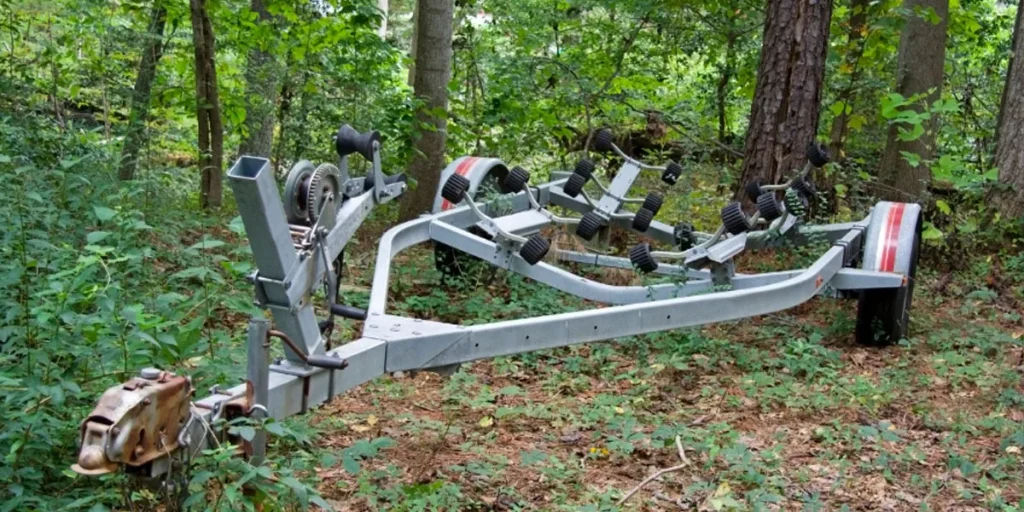On average, a bass boat and trailer weigh about 2,300 pounds. This weight can vary depending on the boat’s size and materials.
When considering the purchase of a bass boat, the total weight, including the trailer, is a crucial factor to consider for towing logistics and vehicle compatibility.
For anglers and boating enthusiasts, a bass boat offers a specialized design for freshwater fishing, particularly for bass species.
These boats often feature a sleek design, powerful outboard motors, and a range of accessories that cater to the angler’s needs, such as rod storage, fish finders, and live wells.
The weight of a bass boat and its trailer plays a significant role in determining the ease of transport and the type of terrain it can navigate.
Choosing the right bass boat requires understanding these factors to ensure a seamless fishing and boating experience.
Navigating The Waters Of Bass Boat Weight

Understanding how much a bass boat and trailer weigh is crucial for safety and compliance.
Correct weight estimations ensure smooth sailings whether you’re towing your boat to the lake or storing it.
Let’s dive in and [explore the variables](#) that define the heft of your aquatic ride.
Typical Weight Range For Bass Boats
Bass boats come in various sizes, impacting their overall weight. A smaller vessel typically tips the scales at around 1,500 pounds.
Larger, feature-rich models can reach up to 3,000 pounds. Trailers add roughly 300 to 1,500 pounds depending on their build and materials.
| Boat Length | Boat Weight (Without Trailer) | Trailer Weight | Total Combined Weight |
|---|---|---|---|
| 16 ft | 1,500 lbs | 500 lbs | 2,000 lbs |
| 18 ft | 2,000 lbs | 700 lbs | 2,700 lbs |
| 20 ft | 2,500 lbs | 1,000 lbs | 3,500 lbs |
| 22 ft | 3,000 lbs | 1,500 lbs | 4,500 lbs |
Factors Influencing Bass Boat Weight
Several factors contribute to a bass boat’s weight. Materials used such as aluminum or fiberglass can affect pounds.
- Hull design and size play a significant role.
- Engines and batteries often add considerable heft.
- Additional features like trolling motors, live wells, and storage compartments factor in.
Custom modifications may elevate the weight further, impacting trailering and fuel efficiency.
Understanding Trailer Weight

Before you hitch up and hit the road, it’s vital to know the weight of your bass boat and trailer. This knowledge ensures safety and adherence to legal regulations.
Towing your bass boat without the right information could lead to mishaps or violations. Let’s dive into the key details.
Average Weight Of Boat Trailers
The trailer is the unsung hero that bears the load of your prized bass boat. Typically, the average weight of a boat trailer ranges from 300 to 1,500 pounds for single-axle models.
Tandem-axle trailers, needed for larger boats, start at about 1,000 pounds and can weigh much more. Consider these average weights:
- Single-axle trailer: 300-1,500 lbs
- Tandem-axle trailer: 1,000+ lbs
Keep in mind the Gross Vehicle Weight Rating (GVWR). It includes the trailer’s weight plus its maximum cargo capacity.
Trailer Add-ons And Modifications
Customizing your trailer can add weight. Here are common add-ons:
| Add-On/Modification | Additional Weight |
|---|---|
| Spare Tire and Mount | 20-50 lbs |
| Swing Tongue | 30-50 lbs |
| Brake System Upgrade | 50-150 lbs |
| Custom Racks or Storage Boxes | Varies |
Balance and distribution of weight are crucial. Too much extra weight affects handling and fuel efficiency.
Total Weight Of Boat And Trailer
Understanding the combined weight of a bass boat and its trailer is crucial. It ensures a safe journey from land to lake.
Let’s dive into the specifics of determining this essential piece of information.
Calculating The Combined Weight
Figuring out the total weight begins with looking at two components: the boat itself and the trailer. Boat weights vary widely.
- Bass boats generally tip the scales between 1,500 to 3,500 pounds.
- Trailers, on the other hand, weigh around 300 to 1,500 pounds.
To get the combined weight, simply add these two together. For example:
| Boat Weight | Trailer Weight | Total Weight |
|---|---|---|
| 2,500 lbs | 1,000 lbs | 3,500 lbs |
Don’t forget to include gear and fuel in the boat for an accurate figure.
Importance Of Knowing The Total Tow Weight
Knowing the total tow weight is not just important—it’s essential. Why?
- Prevent Overloading: Towing over the limit can damage your vehicle.
- Ensure Safety: Correct weight provides stability on the road.
- Avoid Fines: Exceeding tow limits can lead to hefty fines.
Remember to check your vehicle’s tow capacity in the owner’s manual. It should exceed the combined weight for a worry-free trip to the water.
Regulatory Compliance And Safety Concerns
Understanding the weight of a bass boat and trailer is crucial for safe towing. Heavier loads need special attention to follow rules and ensure safety.
Legal Weight Limits For Trailers
It’s important to know the legal weight limits for trailers. Each state has rules that set the maximum weight for vehicles.
These rules protect roads and bridges from damage. For a bass boat and trailer, the weight must stay under these limits.
| Type of Trailer | Typical Weight Limit |
|---|---|
| Single-Axle Trailer | 3,000 lbs |
| Double-Axle Trailer | 10,000 lbs |
Check the specific weight limit for your area before hitting the road with your boat.
Ensuring Safe Towing Practices
Safe towing is not just about following rules. It’s also about preventing accidents. Here are some steps for safe towing:
- Check your vehicle’s towing capacity.
- Use the right hitch and ensure it’s secure.
- Balance the load on your trailer evenly.
- Regularly check the tire pressure.
- Connect all lights and brakes for alerts.
Always perform a safety check before you travel. This keeps you and others safe on the road.
Accessorizing Your Rig: Impact On Weight
Accessorizing Your Rig: Impact on Weight – When it comes to enhancing your bass boat, adding accessories is a thrilling part of customization.
But it’s important to remember that everything added to the boat or its trailer affects the total weight.
This not only impacts the overall performance but can also affect the legality of towing your rig.
Understanding how each accessory contributes to the weight ensures you stay safe and within the legal towing limits.
Common Accessories And Their Weights
Boat enthusiasts love to beef up their rigs with all sorts of gadgets. Below is a breakdown of common accessories and their approximate weights:
| Accessory | Weight (Approx.) |
|---|---|
| Trolling Motor | 40-80 lbs |
| Battery for Trolling Motor | 50-70 lbs |
| Depth Finder | 3-5 lbs |
| Power Pole | 30-40 lbs per pole |
| Extra Fishing Gear | 20-50 lbs |
| Life Jackets and Safety Gear | 10-30 lbs |
Balancing Accessories And Total Weight
Smart accessorizing keeps your rig agile and compliant with towing laws. Here are tips for balancing your additions:
- Check the boat’s weight limit: Start by knowing your bass boat’s maximum weight capacity.
- Assess the trailer’s capacity: Don’t exceed the trailer’s load limit, as this can pose serious safety risks.
- Evenly distribute weight: Arrange accessories in a way that balances the boat’s center of gravity.
- Regularly weigh your rig: Visit weigh stations to ensure your setup isn’t overweight, especially after adding new gear.
Ultimately, a well-balanced boat ensures optimal performance and safe adventuring on the water. By monitoring the impact of each added accessory, you maintain the perfect equilibrium.
Expert Tips For Managing And Reducing Weight
Fishing enthusiasts understand that every pound matters when hauling their gear. An average bass boat and trailer can weigh heavily on your vehicle’s performance, affecting fuel efficiency and ease of transport.
However, by applying smart weight management techniques, you can enhance your bass boat’s performance both on and off the water.
Let’s explore how you can optimize the weight of your setup for the best fishing experience.
Weight-saving Techniques For Anglers
Shrewd packing is a game-changer. Lighten your load with these actionable tips:
- Invest in lightweight gear. Modern fishing equipment offers high-performance without excess weight.
- Limit tackle selection. Bring only what you need for the day, focusing on versatile lures.
- Opt for compact electronics. Modern fish finders and GPS devices are now lighter and more efficient.
- Replace heavy batteries. Consider lithium or other advanced battery technologies for weight savings.
Use a dedicated checklist to avoid unnecessary items on your trip. Every extra item adds to the total weight.
Regular Maintenance To Avoid Weight Creep
Keeping your bass boat in peak condition is vital. Neglect can lead to unwanted added weight. Follow these regular maintenance tips:
- Clean your boat after each trip to prevent buildup of debris and sediment.
- Inspect your trailer. Rust and mud add unnecessary weight and can lead to damage.
- Check for water retention. Ensure bilge pumps and drainage systems are working properly.
- Maintain engine efficiency. A well-tuned engine prevents the buildup of residues.
Regularly weigh your boat and trailer to monitor for incremental increases in weight and address issues promptly.
By actively managing and reducing the weight of your bass boat and trailer, you’ll ensure a smoother, faster journey to your favorite fishing spots and potentially save on costs.
Fish on with maximum efficiency and minimum burden!
FAQ About the Weight of a Bass Boat and Trailer
What Is The Average Weight Of A Bass Boat?
The average bass boat weighs approximately 1,700 to 2,300 pounds.
This weight includes the boat’s hull and built-in features but excludes any additional gear or modifications.
How Much Does A Bass Boat Trailer Weigh?
A typical bass boat trailer can weigh between 300 to 500 pounds. The weight can vary based on the trailer’s construction material and design.
Can I Tow A Bass Boat With A Regular Car?
Some lighter bass boats and trailers may be towable by a regular car.
However, it’s essential to check your vehicle’s towing capacity to ensure it can handle the combined weight safely.
What Factors Influence Bass Boat And Trailer Weight?
Factors include boat length, construction materials, engine size, and additional features.
Trailers vary by material, such as aluminum or steel, and by the presence of added components like spare tire mounts.
Conclusion
Understanding the weight of a bass boat and its trailer is vital for safe towing and compliance with legal limits.
Keep in mind, average figures vary between 1,500 to 2,500 pounds for the boat and up to 1,300 pounds for the trailer.
Always check the specifications of your particular model to ensure accuracy. Safe travels and tight lines!
Resources:
https://www.commerce.gov/news/blog/2022/08/know-you-go-boating-safety-tips-noaa
https://www.trackerboats.com/jon.html
